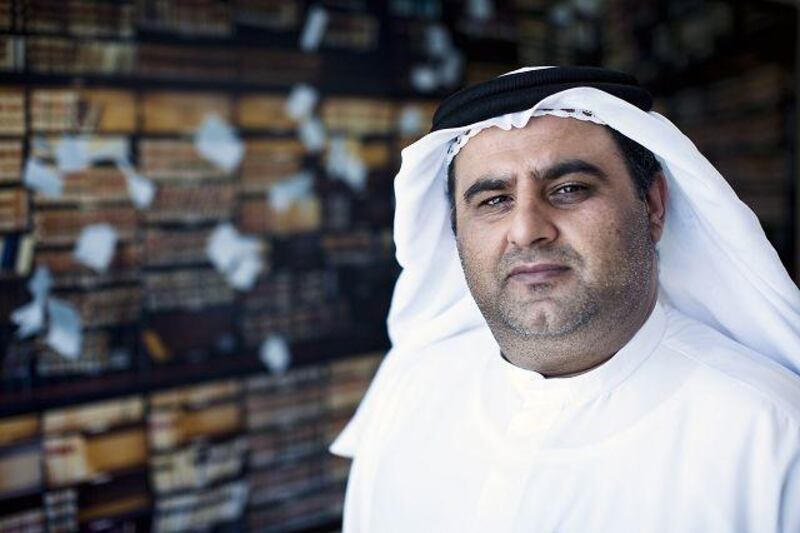ABU DHABI // With Junot Diaz's Drown, a book of short stories charting the life experiences of Dominican Republic migrants in the US, a natural history of seeds and a manifesto on how to maintain sustainable cities, Dr Ali bin Tamim's library is varied to say the least. Dr bin Tamim is the project manager of Kalima, the translation arm of the Abu Dhabi Authority for Culture and Heritage (Adach) launched in 2007. The ambitious, non-profit project funds the translation, publication and distribution of 100 books a year from other languages into Arabic.
Cherry-picking books from various languages, genres and eras is a daunting task, but one Dr bin Tamim insists is essential to the cultural development of the Arab world and its 250 million Arabic speakers. "When you translate a story from one language to another, you don't just bring the words to the new reader you bring the culture, the essence of another way of life and new values," he said. "There are some subjects not yet even considered in Arab libraries. For example, the theory of architecture, animal anthropology or the history of furniture. They are specific subjects but they should be seen in the wider perspective. New ideas can change cultural landscapes."
Dr bin Tamim, an Emirati who studied literary theory at the University of Jordan and earned postgraduate degrees in the UK and the US, is passionate about his task. He personally oversees the translation of every book, making sure to read at least a couple of chapters before it goes to print. "I want to check the quality of the translation," he said. "Some books have idioms and phrases very difficult to translate, I want to make sure the books we publish are of the highest quality possible."
His favourite, Okakura Kakuzo's The Book of Tea, written in 1906 by a Japanese student in America and translated into Arabic by Kalima last year, rests on top of the pile of books on his desk in Adach's offices in Mussafah. "I love this book," he said, smiling. "It is very unusual to have a book written over 100 years ago with such a modern approach. It uses the example of tea to illustrate culture, this is a trend which has only become popular in the last 20 years, so it is contemporary but classical at the same time."
Finding books that tread a middle ground like this is central to Kalima's remit, said Dr bin Tamim. With the resources to translate just 100 books a year, staff must be extremely selective, but still try to reach as large an audience as possible. Recent translations include Every Step Must be a Goal, the memoirs of the former French president Jacque Chirac, A Thousand and One Contemporary American Poems, and Kafka on the Shore, a novel by the popular Japanese author Haruki Murakami.
"We have commercially viable books like bestsellers, academic textbooks, factual volumes and historical fiction, poems and philosophy, all of which are important," said Dr bin Tamim. "Kalima wants to serve the needs of the common reader and the university professor, we want to connect with everyone, to tread a path through the middle." Researchers and intellectuals from all over the world feed Kalima with suggestions for translations. They have representatives at every major international book fair, a team to concentrate on international bestsellers and prize-winning titles and about 300 dedicated translators who make individual suggestions.
Suggestions also come from academic partnerships Kalima has formed with universities and cultural authorities globally, such as the Johannes Gutenberg University in Mainz, Germany and the India Arab Cultural Centre in New Delhi. The shortlist of 100 titles is whittled down by the Kalima general committee, which has 10 members based in the UAE, Jordan, Germany, Italy, Egypt and the US. Before being selected they are cross-checked against existing translated works, grouped into a genre and studied by the committee.
Staff then corresponds with the copyright owners to obtain the publishing and international distribution rights and begins the arduous process of translation. "Part of our work at Kalima is to boost the translation industry. Currently there is no reliable information about Arabic translators and no list publishers can refer to," said Dr bin Tamim. "Translation is done at an average rate of 100 pages a month depending on the subject matter and genre of the book," he said. "We want to make sure our translators are dedicated to the task and are of the best quality so we set our standards high." After being printed in the UAE or Lebanon, the books are distributed to a network of 200 outlets in the Gulf and a small percentage of texts are sent to specialist stores in North America.
"We want to increase the number of Arab readers by improving their access to rich, intellectual and thought-provoking books from the cultural variety of the world. "Ultimately we want readers to discover different cultures but at the same time discover that common human values exist in all cultures. Such knowledge can only be gained by reading as much as possible." aseaman@thenational.ae






